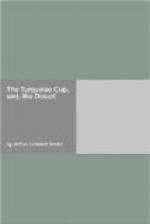Ali bowed and showed his white teeth.
“To-morrow,” continued Abdullah, “since it is Friday; and immediately after the middle prayer. I hear in the bazaar that the well at Okba is choked. Can we make forty-two miles in one day, so as to cut Okba out?”
“We can,” said Ali, “during the first three days, when the beasts do not drink; after that—no.”
“Good,” said Abdullah; “I will make a route.”
Some one plucked at his sleeve and he turned.
“Sir,” said a man with a white beard and eager eyes, “I learn that you start for Biskra to-morrow.”
“If Allah wills,” said Abdullah.
“In crossing the desert,” said the old man, “I am told there are many dangers.”
“Friend,” said Abdullah, “in sitting at home there are many dangers.”
“True,” said the old man; and, after an interval, he added, “I think I may trust you.”
Abdullah shrugged his shoulders and rolled a cigarette.
“Would it please you,” said the old man, “to take a passenger for Biskra?”
“At a price,” replied Abdullah, striking a match.
“What is the price?” asked the old man.
“Do you pay in dates, hides, ivory, or gold-dust?”
“In dust,” replied the old man.
Abdullah threw away his cigarette. “I will carry you to Biskra,” said he, “for eight ounces, and will furnish you with dates. If you desire other food, you must provide it. You shall have water, if I do.”
“It is not for myself that I seek passage,” said the old man, “but for my daughter.”
“In that event,” said Abdullah, “the price will be nine ounces. Women cast responsibility upon me.”
“And her maid-servant?” asked the old man.
“Eight ounces,” replied Abdullah.
“It is all I have,” said the old man, “but I will give it.”
“If you have no more,” said Abdullah, “Allah forbid that I should strip you. I will carry the two for sixteen ounces.”
“Allah will make it up to you,” said the old man. “If you will deign to accompany me to the bazaar, I will pay you immediately.”
They went to the arcades about the square and entered the shop of Hassan, the money-changer.
The old man pulled at his girdle and produced, after many contortions, a purse of gazelle skin.
“Friend Hassan,” he said, “I wish to pay to this, my son, sixteen ounces. Kindly weigh them for me.”
Hassan produced his scales. They consisted of two metal disks, suspended by silk threads from the ends of a fern stem. He balanced this stem upon the edge of a knife, fixed above his table. In one of the pans he placed a weight, stamped with Arabic characters. The pan fell to the table. Hassan produced a horn spoon, which he blew upon and then carefully wiped with the hem of his burnoose. He handed the spoon to the old man, who felt of the bowl.
“It is dry,” he said; “nothing will stick to it.”




